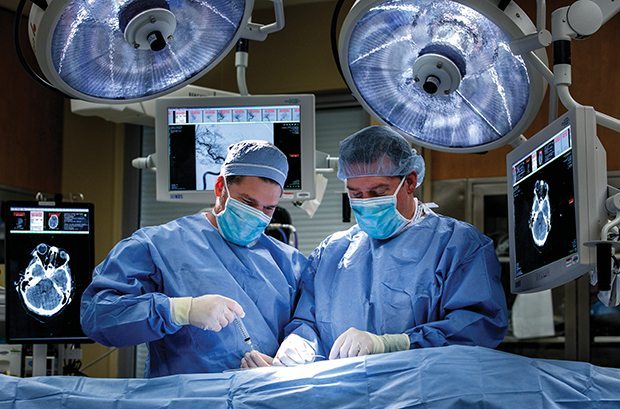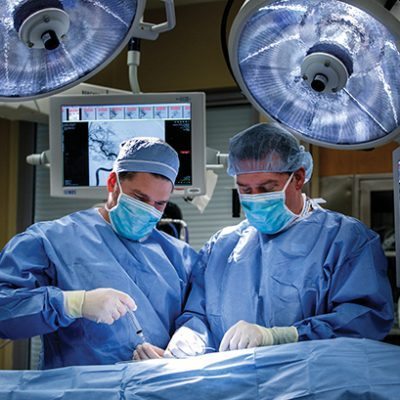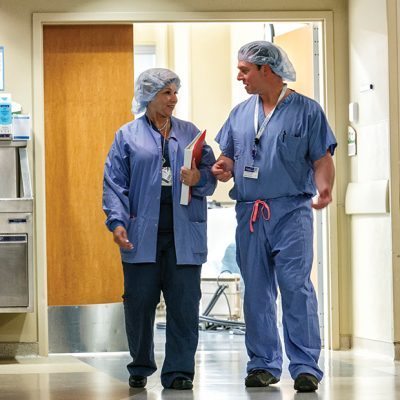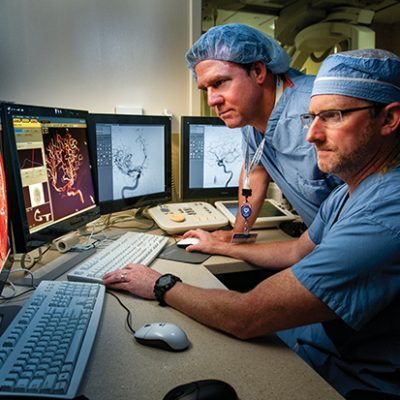
Jersey Shore University Medical Center recently debuted a specialized post-operative unit for the state’s most critical neurological and neurosurgical patients
by Jessica Jones-Gorman • Photos By Amessé Photography
After identifying a need for specialized neurosurgical care within the state, Jersey Shore University Medical Center recently unveiled a post-operative intensive care unit to treat patients with life-threatening neurological and neurosurgical illnesses. The first of its kind in Monmouth and Ocean Counties, Jersey Shore’s Neuro-ICU provides specialized, comprehensive care for severe conditions and also offers access to the region’s only designated comprehensive Stroke Rescue Center and Level II Trauma Center. For New Jersey residents, it is a lifesaving development.
“Meridian Health treats more than 2,000 stroke patients a year,” noted Dr. Ronald Benitez, medical director for Stroke Rescue Center at Jersey Shore. “In severe cases, patients may suffer a hemorrhagic stroke, when an aneurysm ruptures in the brain, or a severe ischemic stroke, when a blood vessel is blocked. For these patients, immediate access to the Neuro- ICU’s state-of-the-art treatments, physician experts, and advanced monitoring can dramatically improve survival rates.”
Jersey Shore’s 12-bed Neuro-ICU provides post-operative critical care for the most complex neurological procedures, including subarachnoid hemorrhage, aneurysm, complex stroke, bleeding in the brain, brain injury, epilepsy, spinal cord disorders, and nerve and muscle diseases. There, patients receive intensive monitoring and around-the-clock care from a team of clinicians from neurosurgery, neurology, trauma, radiology, anesthesiology, nutrition, pharmacology, physical therapy, and social work. Patients typically require a one- to two-week stay in the Neuro-ICU and are assigned a dedicated nurse for one-on-one care.
“When someone experiences a traumatic brain injury or a massive stroke, timely care from a team of specialists can make all the difference in their recovery,” noted Dr. Adam Shiroff, chief of Trauma and co-medical director of Neuro-Intensive Care at Jersey Shore. “As the first in the region, Jersey Shore’s Neuro-ICU provides these patients a comprehensive post-operative recovery experience supported by neurological and neurosurgical intensivists, the most advanced technology and monitoring, and educational resources for families and patients.”
The Neuro-ICU is the latest achievement for Jersey Shore, the only hospital in the region to be both a state-designated Comprehensive Stroke Center and nationally accredited Primary Stroke Center, offering the most advanced treatment options and interventional procedures. Treatment may involve multi-disciplinary teams of specialists who are adept at working together in a variety of settings, including the endovascular suite in Jersey Shore’s hybrid operating room.
The Stroke Rescue Center, which is celebrating its 10th year, has multiple locations across Meridian’s five campuses and board-certified neurologists available 24 hours a day, seven days a week. Additionally, comprehensive rehabilitation services (there are more than 12 outpatient centers) and home care are available for continued support.
“When someone has chest pain, they are rocketed through the system, and Jersey Shore identified the need to do the same with stroke patients,” Dr. Benitez said. “We are one of the hospitals at the forefront of stroke treatment. The comprehensive Stroke Center has not only the neurology interventional capabilities but is also equipped to perform endovascular procedures as well. There’s only a handful of hospitals in the state that can do that.”
Benitez, who completed his undergrad at SUNY Binghamton before attending Georgetown Medical School and finishing a residency at Thomas Jefferson University Hospital in Philadelphia, said he became involved in the field of Neurology as a second-year medical student when he realized just how many fascinating breakthroughs were awaiting the right research.
“I found it fascinating that we learned so much in our Neuroscience class, but at the end of the day there was still so much more to be discovered,” Dr. Benitez said. “I wanted to study and research this field more because it was so interesting and untapped to me. And as a student, when I scrubbed in on my first craniotomy and the skull was opened and the brain was right there…I was simply in awe.”
And while throughout the span of his career there have been technological advances and marked improvements in the way neurological issues are diagnosed and treated, Benitez credits the success of Jersey Shore’s Stroke program to the hospital’s simple but significant multidisciplinary approach.
“The rapid evaluation and treatment of stroke really requires a large team,” he said. “And we have a wonderful group of talented people—everyone from neurology to the ER—who works together to follow the proper algorithms and treat the patient accordingly. The amount of people involved is a crucial part of this program, and I think it’s that type of integrated approach that has made all the difference.”
Meridian Neuroscience
Jersey Shore University Medical Center
1945 Route 33, Neptune / 800.560.9990 / meridianhealth.com





